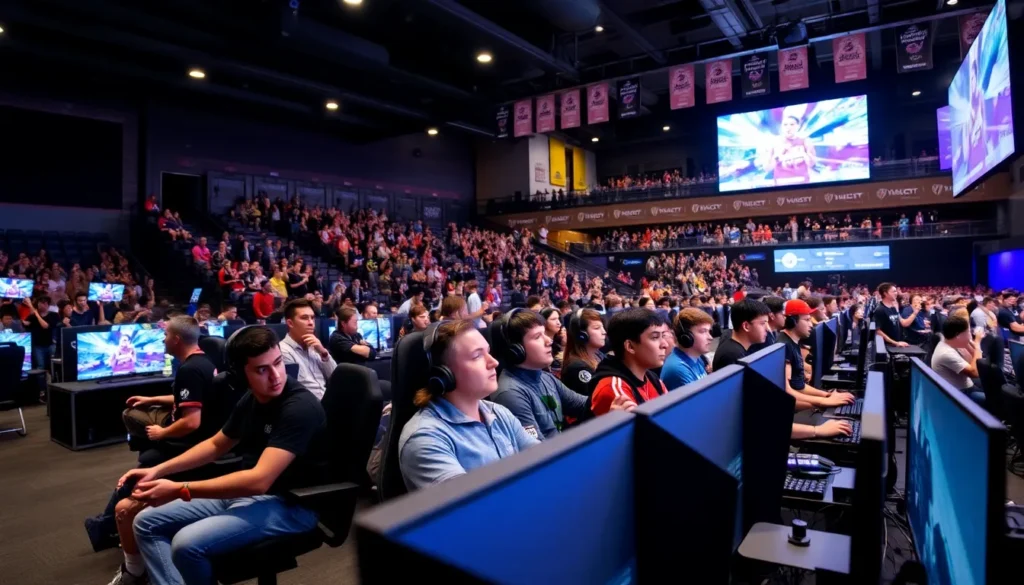Table of Contents
ToggleIn the fast-paced world of esports, winning isn’t just about skill; it’s about strategy. Enter esports analytics tools—the secret weapons that turn average players into champions. Imagine having the power to dissect every move, track every stat, and predict your opponent’s next play like a seasoned fortune teller. Sounds like magic, right? Well, it’s just data at work.
Overview of Esports Analytics Tools
Esports analytics tools play a crucial role in enhancing competitive gaming. These platforms offer insights into gameplay patterns by analyzing player statistics, engagement rates, and match outcomes. Players can optimize strategies through data-driven decisions, which helps elevate their performance levels.
Many tools focus on real-time data collection. For example, platforms like ESL and Gamepedia provide comprehensive statistics on player movements, match history, and win rates. Players can access these metrics to make informed adjustments during competitions.
In addition, some tools specialize in predictive analytics. By employing machine learning algorithms, these platforms forecast likely outcomes based on historical data. This capability enables teams to anticipate opponents’ tactics and adapt their strategies accordingly.
Collaboration among team members benefits significantly from using these analytics tools. Data sharing fosters communication and alignment, ensuring everyone on the team understands key insights. By leveraging collective knowledge, teams can create more effective game plans tailored to their strengths.
Moreover, featuring user-friendly interfaces is a common trait among the best esports analytics tools. Ease of navigation allows players and coaches to quickly interpret data and apply insights dynamically.
Integrating these tools into regular practice enhances overall performance and strategic understanding within esports. The competitive nature of gaming demands that players utilize every advantage available to succeed. Embracing analytics not only maximizes potential but also contributes to long-term growth and development in the esports landscape.
Importance of Data in Esports

Data plays a pivotal role in enhancing performance and refining strategies within esports. By utilizing analytics tools, players gain access to vital information that drives improvement.
Enhancing Performance
Performance enhancement stems from real-time data collection. Players analyze metrics such as accuracy, response times, and decision-making processes to identify strengths and weaknesses. These analytics reveal gameplay patterns that inform training sessions. For instance, players can assess which strategies yielded the best outcomes in past matches. Coaches also leverage insights from data to provide targeted feedback. Monitoring individual contributions further allows teams to tailor training programs that address specific skill gaps. Benchmarking against historical performance helps set achievable goals, fostering motivation and consistent progress.
Improving Strategies
Improved strategies rely heavily on accurate data interpretation. Teams analyze opponents’ tactics through trend analysis, which reveals tendencies that inform counter-strategies. Predictive analytics enable teams to anticipate in-game actions and plan accordingly, increasing competitiveness. Understanding enemy playstyles allows teams to create adaptive game plans that shift dynamically during matches. Collaboration among teammates becomes seamless when analytics tools facilitate data sharing, ensuring collective insights drive strategy formulation. Emphasizing these insights leads to strategic flexibility, positioning teams for success in high-stakes environments.
Popular Esports Analytics Tools
Numerous esports analytics tools significantly enhance gameplay analysis. Below are three noteworthy options with distinct features and benefits.
Tool 1: Features and Benefits
StatBanana stands out as an advanced analytics tool for players of Counter-Strike: Global Offensive. It provides real-time data on weapon performance, map dynamics, and player statistics. Users access detailed match histories, allowing them to identify strengths and weaknesses based on performance metrics. StatBanana empowers players to make informed decisions that enhance gameplay strategies. The ability to analyze weapon efficacy elevates competitive play, making it a favored choice among professionals.
Tool 2: Features and Benefits
Mobalytics serves as a comprehensive tool for League of Legends players, focusing on performance analysis and skill improvement. It features a unique “GPI” (Gamer Performance Index) that benchmarks individual performance against peer averages. Moreover, Mobalytics helps players set personalized goals based on identified areas for growth. The tool offers insights into match data and recommends tailored training assistance. This level of customization fosters development and elevates overall gaming proficiency, making it a valuable asset for aspiring and seasoned players alike.
Tool 3: Features and Benefits
Hearthstone Deck Tracker excels in Hearthstone gameplay analysis, providing real-time tracking of deck performance and match statistics. Players receive insights on win rates, card usage, and efficient strategies to counter opponents. The tool highlights synergies and potential game-winning plays during matches. With built-in features such as replays and hand history evaluations, users enhance their understanding of gameplay evolution. Hearthstone Deck Tracker significantly improves strategic planning, optimizing outcomes and fostering competitive excellence within the game’s environment.
Choosing the Right Esports Analytics Tool
Selecting the right esports analytics tool involves understanding specific needs and objectives. Different tools cater to varying aspects of gameplay analysis, so careful consideration is essential.
Considerations for Teams
Teams should prioritize tools that facilitate collaboration and enhance strategy formulation. Features like trend analysis help reveal opponents’ tactics, proving valuable in developing counter-strategies. Real-time data collection strengthens communication among team members, ensuring everyone is aligned on objectives. Tools like StatBanana provide in-depth performance metrics, allowing teams to benchmark against historical data. When analyzing past matches, teams can identify patterns that inform future gameplay adjustments.
Considerations for Individual Players
Individual players need tools that focus on personal performance improvement. Customizable analytics dashboards allow players to track personal metrics such as accuracy and response times. Mobalytics, for instance, helps players set and monitor personalized goals through its Gamer Performance Index (GPI). Players seeking to refine strategies can benefit from real-time insights offered by Hearthstone Deck Tracker. Prioritizing tools that emphasize individual growth leads to better decision-making and enhanced competitive skills.
Future Trends in Esports Analytics
Emerging trends in esports analytics highlight the growing integration of artificial intelligence (AI) and machine learning (ML). These technologies automate data analysis, enabling real-time insights that revolutionize strategic planning. Predictive modeling will gain prominence, allowing teams to forecast opponent behavior with greater accuracy. Enhanced algorithms will track gameplay in ways that adapt to evolving strategies, creating dynamic models for players and coaches.
Collaboration tools will see a surge in use, facilitating teamwork by sharing data insights effectively. Communicating diverse interpretations of data strengthens overall strategy development. Gamification of analytics will also rise, engaging players through interactive platforms that visualize performance metrics creatively. Visualization formats such as heat maps and graphs will enhance understanding of complex data points.
Cloud-based analytics solutions will increasingly offer scalability and accessibility, making advanced tools available to a broader range of players and teams. Integration across multiple games will allow cross-comparative analysis, fostering insights that transcend individual titles. Platform interoperability will become crucial, as players value tools that seamlessly connect with existing systems.
Real-time feedback through wearable devices will emerge, providing physical and mental performance metrics to players during matches. Capturing physiological data alongside gameplay statistics will help refine performance and sustain optimal conditions. Engaging sports science experts alongside data analysts will enhance player’s overall well-being and competitive edge.
Finally, a focus on ethical data use will grow, emphasizing player consent and privacy. As the industry evolves, establishing guidelines for responsible analytics usage will become essential. Adapting to these trends ensures teams stay ahead in an ever-competitive landscape, maximizing their potential through informed decision-making driven by innovative analytics tools.
Esports analytics tools are revolutionizing how players and teams approach competition. By leveraging data-driven insights players can refine their strategies and enhance overall performance. The ability to analyze gameplay patterns and track statistics empowers both individuals and teams to make informed decisions.
As the esports landscape continues to evolve the integration of advanced technologies like AI and machine learning will further enhance these tools. Staying ahead of the curve by embracing these innovations will be crucial for players aiming to maximize their potential. The future of esports analytics promises exciting developments that will shape the strategies of tomorrow’s champions.







